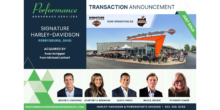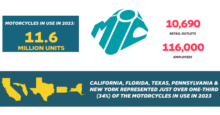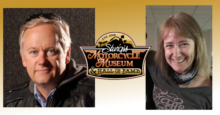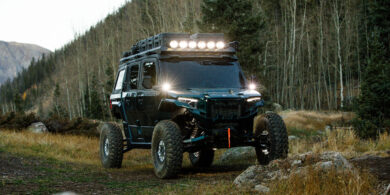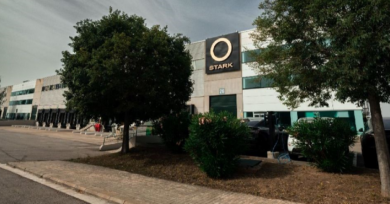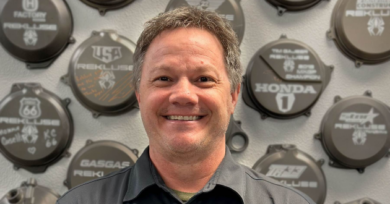Dealer Expo 2003
Following the tragedy of Sept. 11, the management of Parts Unlimited was faced with a difficult decision. What should they do in the next year? Retail sales following the tragedy were off and managers in the powersports industry didn’t know if business would rebound during the upcoming months. Dealers were cutting back on their orders because consumers had stopped buying, and many distributors were reducing their purchases from aftermarket suppliers. The industry was in distress.
“But, we look at things differently,” says Jeff Fox, president of Parts Unlimited and its sister company, Drag Specialities.
The tragedy of September 11, 2001, affected many people in many different ways, but in a very real sense it demonstrated why Parts Unlimited is the market leader in this industry. Like managers in most businesses, the leaders at Parts had decisions to make. Move ahead? Stay pat? Cut back?
“We had a lot of meetings,” recalls Fox. “We saw dealers and other distributors in our industry slowing down; everybody said to slow down. The net result was that people were cutting budgets and cutting inventory, but we thought they were overreacting. We look at things differently.”
What Parts management saw was a potential inventory shortage. What would happen, they thought, if consumer demand picked up where it was before 9/11? There wouldn’t be enough inventory in the system.
“If we get a bunch of dealers,” recalls Fox, “whose main supplier was a competitor, and they decided to come over and start buying because the competitors didn’t have it… We didn’t forecast those guys to come over, and we would have run out of inventory. Our fill rate would have gone way down.”
So, Parts called its suppliers and stepped up its orders, buying several million dollars worth of “extra” inventory. Since those orders required lead times of anywhere from 90 days to 180 days, the extra inventory didn’t cause any warehousing problems for Parts.
Parts took the ultimate gamble to add millions of dollars worth of extra inventory when others were standing pat.
“We basically added inventory,” says Fox, “and we did more promotions than ever. We decided we would go drive the bus, so to speak. We wouldn’t let the economy drive the bus. We made decisions about how we were going to run this company, and it was quite different than my competitors.”
Parts made the same heavy commitment to extra inventory the next year and last year. And it didn’t cut anything—not staff, not budget, not advertising. “We negotiated,” says Fox, “to get better terms and better discounts, better something. But it was in the interest of everybody to keep going so production didn’t decline.”
Did the strategy work for Parts? “We had a good year,” Fox says simply. “It was slow for a few months after 9/11, but then it picked up.
“(The business) was kind of like a puppy; every month it looked good, and after six months it looked pretty good and after nine months, very good. You just didn’t see it growing so fast at the time.” Parts has been posting double digit annual growth for the last several years.
While Fox was willing to discuss many topics during a wide-ranging interview with Powersports Business at the Parts headquarters in Janesville, Wis., he wouldn’t talk about plans for the Dealer Expo in Indianapolis other than to say there would be new products and new promotions. Talk to him after the show, he said.
Fox did say that Drag Specialty chose not to display in the RCA Dome this year because it didn’t work to split the Drag and Parts exhibits.
“It would have been too difficult,” says Fox, “because we have so much cross over in suppliers and dealers. We need everyone together.”
WINNING THE WAR
So, is being daring the main reason why Parts continues to add market share? Partly.
“The real reason,” says Fox, “is we have inventory. And we have competitive programs. And the best catalog. And the most product lines. And great advertising. And great special events and promotions. And we have loyal employees, great employees.” There are about 1,400 Parts employees in North America.
SUPPORTING THE SPORT
Parts is big on promotions and special events; perhaps the biggest are its four dealer rides each year and its aggressive involvement in many consumer events.
Watch a motorcycle racing event on TV and you’ll see the red, white and blue Parts Unlimited logo plastered from one end of the venue to the other. What’s the point, since Parts doesn’t sell direct to the consumer? Or is going direct part of its plan? Never, says Fox.
“There are some Parts branded products,” he notes, “but we’re not going in that direction.” Supporting the sport, he says, just makes good business sense for everyone. “We’re putting our money where our mouth is,” he says.
Showing off the Parts logo is basic marketing, he says. It drives consumers into dealerships.
“If a consumer goes into a dealership and wants to buy Parts products,” says Fox, “the dealer will put his arm around the consumer and say, ‘I’ve got it right over here,’ and he takes the customer to the Parts catalog.
“The bottomline is, the dealer might not be buying from us, but he knows that customer comes in and asks about Parts Unlimited. If the dealer is buying most of his stuff from us, he feels good about it. If he isn’t, he’s thinking about it. So, how does it hurt?”
Local dealers are invited to the events whose venues range from flat tracks to supercross events to ATV races.
“The idea,” says Fox, “is to show dealers we support the sport and to drive consumers into their store. We want them to know we support the sport, and that’s the easiest way to do it.”
Speaking of promotions, Fox has taken the company into the movie business with a recent sponsorship of the new movie, MotoX Kids. The family motorcycle movie is produced by TAG Entertainment, and sponsored and promoted by Clear Channel Entertainment and a host of firms including Sports Illustrated for Kids, Nickelodean, Disney Adventure and Boy’s Life.
It seems to fit perfectly with Parts’ Support the Sport theme. Says Greg Blackwell, Parts vice president of marketing: “A movie like this gets people interested in and excited about motorcycling, and that’s the kind of thing that Parts Unlimited always likes to be involved with.
“If this brings more people into the sport, and we think that it can, it will also bring more people into the dealerships.”
Along with helping with some of the apparel like its Thor line and some other items for the production of the movie, Parts is distributing P.O.P. materials through its reps and dealer network.
“Simply” says Blackwell, “we think that the movie is going to be a lot of fun, and the whole idea behind our ‘We Support the Sport’ company philosophy is that fun and increased business go hand-in-hand in our industry.”
No dollar figure on Parts’ involvement was available.
An exclusive showing of the movie was given to Parts dealers and their families Jan. 29. The release schedule calls for openings in successive markets in conjunction with Supercross GP tour dates in San Francisco, Houston, Atlanta, Indianapolis, Pontiac, Irving, and Salt Lake City.
Parts Unlimited also is big on dealer rides. It has one snowmobile ride and three off-road rides and is looking at adding more of them. Dealers are invited based upon their purchase levels.
“The essence of the rides,” says Fox, “is to get dealers to buy enough to win the opportunity to come on the ride. Suppliers get to sit down with dealers to find out what they are doing right and wrong and what they need to add to their line.”
Parts sales reps are there, too, as are Parts managers. “It’s a chance to hear what we’re doing right and wrong, too,” says Fox.
PROPRIETARY PRODUCTS
Parts Unlimited has a growing number of proprietary products, but in most cases it’s not by choice. “We’re a true distributor,” says Fox. “We buy and sell.”
Fox said the company prefers to buy a product to fill any market niches it identifies. But if it can’t find a supplier who can meet the need, it will do so itself. That was the case with its new Icon brand.
“Icon is a completely different niche than anyone was attacking,” says Fox. “No one was hitting the niche so we did it.”
WHAT”S NEXT?
Fox sees a good year for the powersports industry in 2004. “I think the industry is in good shape, I really do. I go to events 22 weekends a year and I talk to lots of reps and dealers. Business is getting better all the time.
“I think that the guys who have the right system in place and the right inventory and right products are going to have a good year. It’ll be a tough year, with peaks and valleys, not more than the last two years but more than three years ago prior to 9/11. Dealers are buying more aggressively than they have in the past.”

